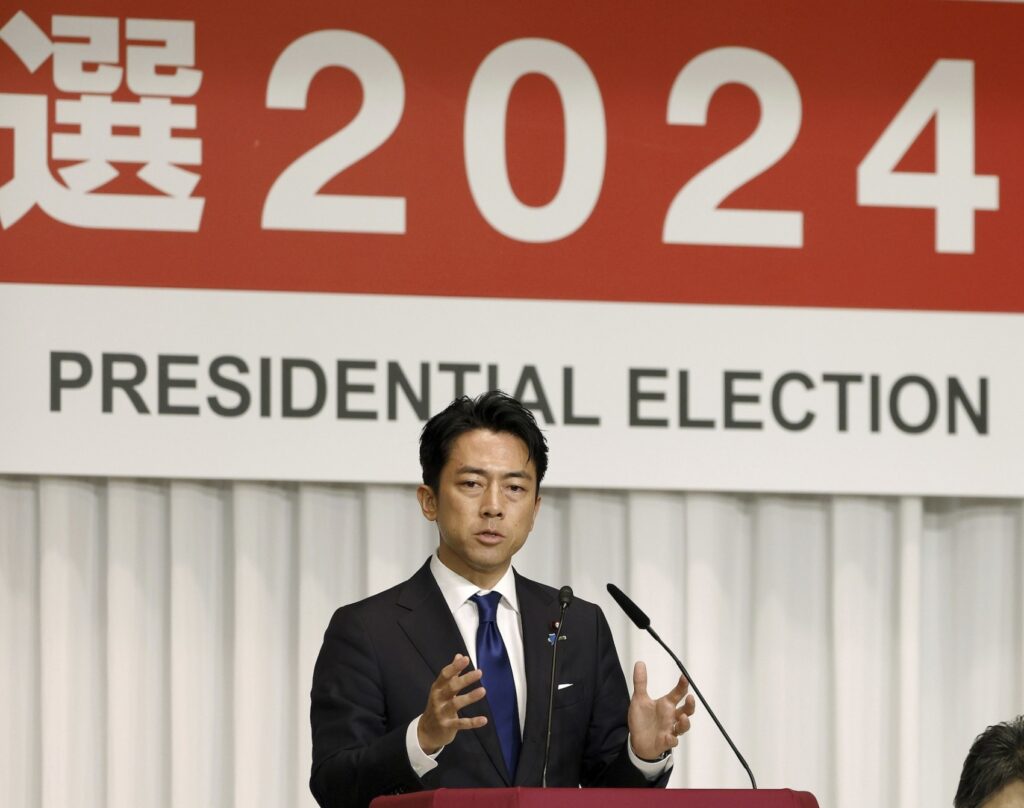The pledge by 43-year-old Shinjiro Koizumi, the youngest candidate in the running to be Japan’s next prime minister, to hold talks with “same generation” North Korean leader Kim Jong Un to resolve the abduction issue has garnered widespread attention.
Japan and North Korea have no diplomatic relations, but Koizumi’s father, Junichiro Koizumi, was the first Japanese prime minister to visit Pyongyang and secured the return of five people abducted by North Korea in the late 1970s.
If Shinjiro Koizumi wins the Liberal Democratic Party’s presidential election scheduled for Sept 27, he would become Japan’s premier, replacing incumbent Fumio Kishida, as the LDP and its junior coalition partner Komeito party control both chambers of parliament.
While his father arranged his visit to North Korea through secret negotiations orchestrated by a senior Japanese Foreign Ministry official, the younger Koizumi has yet to reveal how he would pave the way for a meeting with Kim.
Moreover, he apparently does not have any channels to reach out to Kim, who is believed to have turned 40 in 2024, as he has not been engaged in diplomacy during his 15-year political career. His only role in the cabinet has been as environment minister.
A Japanese government source said, “I cannot imagine Shinjiro would shake hands with Kim Jong Un,” adding Koizumi has “just offered lip service to gain public support, as I have not heard anything about his vision on how to lay the groundwork for such bilateral talks.”
With a high-profile slush funds scandal significantly eroding public trust in the LDP, Koizumi announced his bid for the party’s leadership race in early September with the backing of many lawmakers who are counting on his popularity to retain their Diet seats.
Since campaigning kicked off on Sept 12, the record nine candidates for the presidential election have frequently appeared on TV, pitching their policies, which include how to enhance the transparency of political fund usage and address the abduction issue.
During a joint debate with other contenders late last week, aired on the public broadcaster, Koizumi said, “Once I become prime minister, I will be a leader of the same generation” as Kim, which is “important for resolving the longstanding abduction issue.”
“Our fathers have met before,” Koizumi said, adding, “As leaders of the same generation, I want to explore new opportunities for dialogue. I aim to open up new possibilities that have not yet been realized through diplomacy led by leaders.”
Naoki Hyakuta, a former novelist who founded the Conservative Party of Japan in 2023, criticized Koizumi, saying on social media, “He may think that if he drinks and sings together” with Kim, he can “resolve the abduction issue” with North Korea.
Some political analysts say such Koizumi’s remarks have not gone down well with LDP lawmakers. Even before entering the leadership race, he was known for his occasionally idiosyncratic language, which some jokingly refer to as “poems.”
When he served as environment minister for around two years until 2021, he said, “I think things cannot continue as they are now. That is why Japan cannot continue as it is now,” and, “Thanks to remote work, some official duties can now be carried out remotely.”
While Koizumi, a fifth-term House of Representatives member, was initially viewed as one of the frontrunners to become Japan’s next political leader, his TV appearances seem to be working against him, with recent media polls showing a decline in support.
According to a Kyodo News poll released in mid-August, Koizumi came out on top with 24.2 percent support among LDP supporters, but he dropped to third place with 19.1 percent in a survey conducted over two days through Monday.
Tatsuhiko Yoshizaki, chief economist at the Sojitz Research Institute, said, “In just past five days, we have seen many developments. We hear people saying that someone is already losing momentum or that someone else is surprisingly strong.”
“I think it is quite difficult to take the lead and run away with it in an election in the age of social media,” he added.
Since 2002, Japan has sought the release of 12 others it has officially recognized as having been taken by North Korea. Tokyo also suspects Pyongyang’s involvement in the disappearances of other Japanese citizens.
In 2014, Japan signed the Stockholm accord with North Korea, in which Tokyo promised to relax economic sanctions on Pyongyang in exchange for its agreement to undertake a full-scale investigation into the abduction issue.
But North Korea repeatedly postponed reporting the results of its investigation and then suspended its probe after Japan imposed additional sanctions in 2016 following Pyongyang’s nuclear and missile tests. The North now claims that the abduction issue has been resolved.



